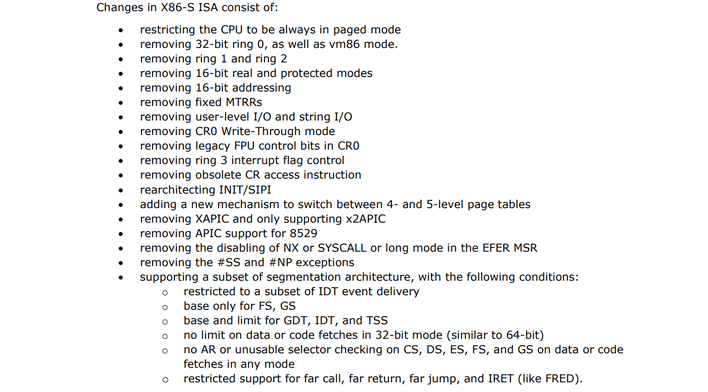Intel's X86S Proposal Cuts Legacy Cruft For Streamlined 64-Bit Only CPUs

Intel, actually, is the among the groups making that case, or at least presenting the idea. In a blog post titled "Envisioning a Simplified Intel Architecture," Intel offers up "x86-S," where the "S" presumably stands for "simplified." It's a revision of the current x86-64 ISA that trims off all of the legacy cruft to stand on its own as a 64-bit-only instruction set architecture.
What legacy cruft, you may ask? There's quite a lot. The origins of the modern x86-64 ISA lie in the Intel 8086 processor that was released all the way back in 1978, and an incredible amount of that original instruction set remains in modern processors, to say nothing of the extensions added with each successive processor: the 286, 386, and 486, the Pentium and its later MMX derivatives, and so on.

Don't fuss too much about the phrase "64-bit only." What Intel is referring to is the "long mode" of x86-64 CPUs. In other words, these would be chips that can only operate in 64-bit mode, just as your current processor almost certainly already does. None of your 32-bit applications should be affected; Intel notes that this change would allow CPUs to use the "simplified segmentation model of 64-bit mode for 32-bit applications."
Intel's proposal comes in the form of a whitepaper that's 46 pages long and extremely technical in nature. If you're not a seasoned x86 assembly programmer or processor architect yourself, you're fairly unlikely to make heads or tails of it. As an end-user, if you're not using 16-bit applications, the change you'd be most likely to notice would be accelerated boot speeds even over what we already have.
Interestingly, the way Intel describes these "legacy reduced" processors sounds like they would exist alongside standard Intel64 (or x86-64) processors. In fact, Intel describes a scenario where a standard Intel64 processor implements the new features from x86S, including 64-bit native boot. The company is inviting feedback on the proposal from, apparently, anyone. If you'd like to comment, head to this page and click the link at the bottom.


